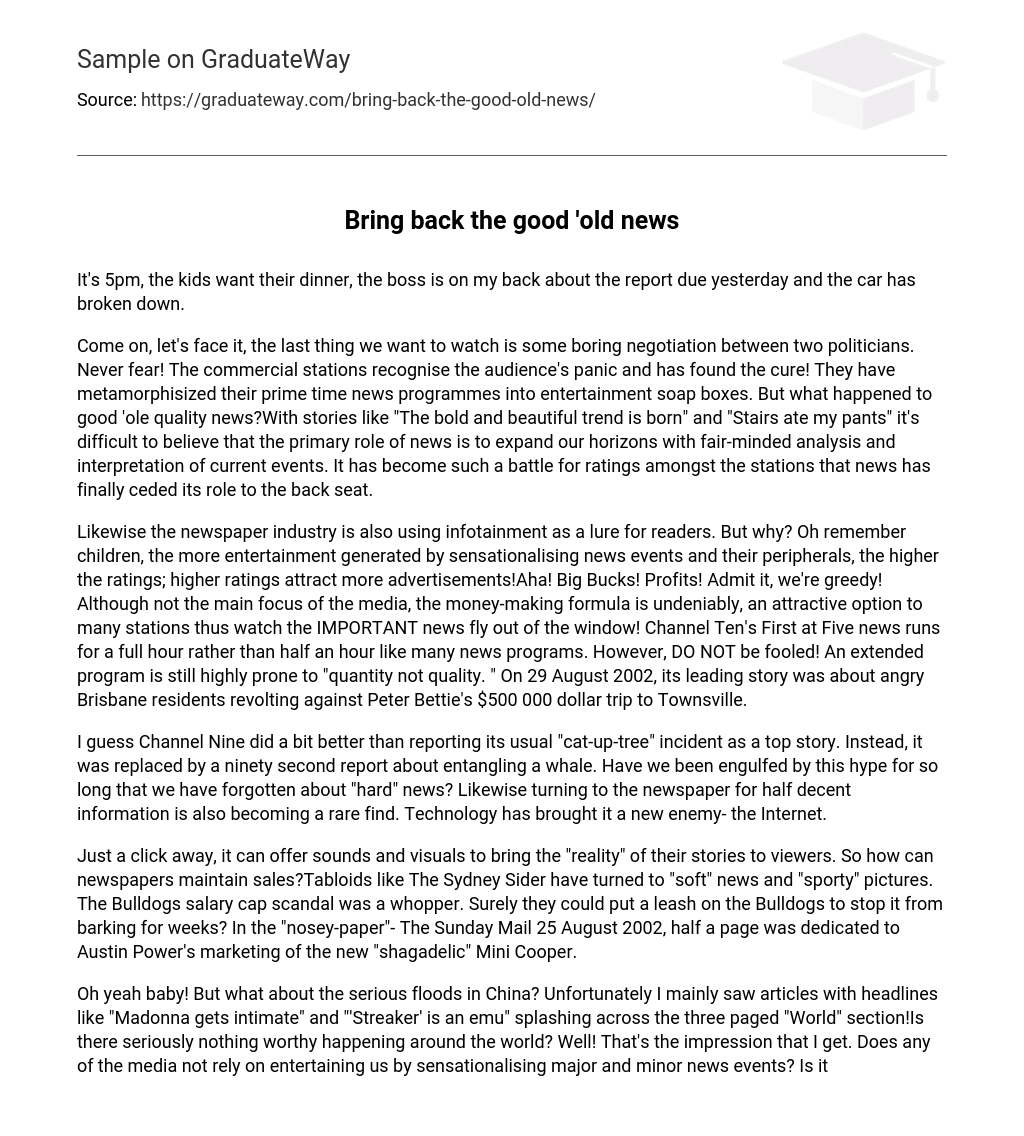It’s 5pm, the kids want their dinner, the boss is on my back about the report due yesterday and the car has broken down.
Come on, let’s face it, the last thing we want to watch is some boring negotiation between two politicians. Never fear! The commercial stations recognise the audience’s panic and has found the cure! They have metamorphisized their prime time news programmes into entertainment soap boxes. But what happened to good ‘ole quality news?With stories like “The bold and beautiful trend is born” and “Stairs ate my pants” it’s difficult to believe that the primary role of news is to expand our horizons with fair-minded analysis and interpretation of current events. It has become such a battle for ratings amongst the stations that news has finally ceded its role to the back seat.
Likewise the newspaper industry is also using infotainment as a lure for readers. But why? Oh remember children, the more entertainment generated by sensationalising news events and their peripherals, the higher the ratings; higher ratings attract more advertisements!Aha! Big Bucks! Profits! Admit it, we’re greedy! Although not the main focus of the media, the money-making formula is undeniably, an attractive option to many stations thus watch the IMPORTANT news fly out of the window! Channel Ten’s First at Five news runs for a full hour rather than half an hour like many news programs. However, DO NOT be fooled! An extended program is still highly prone to “quantity not quality. ” On 29 August 2002, its leading story was about angry Brisbane residents revolting against Peter Bettie’s $500 000 dollar trip to Townsville.
I guess Channel Nine did a bit better than reporting its usual “cat-up-tree” incident as a top story. Instead, it was replaced by a ninety second report about entangling a whale. Have we been engulfed by this hype for so long that we have forgotten about “hard” news? Likewise turning to the newspaper for half decent information is also becoming a rare find. Technology has brought it a new enemy- the Internet.
Just a click away, it can offer sounds and visuals to bring the “reality” of their stories to viewers. So how can newspapers maintain sales?Tabloids like The Sydney Sider have turned to “soft” news and “sporty” pictures. The Bulldogs salary cap scandal was a whopper. Surely they could put a leash on the Bulldogs to stop it from barking for weeks? In the “nosey-paper”- The Sunday Mail 25 August 2002, half a page was dedicated to Austin Power’s marketing of the new “shagadelic” Mini Cooper.
Oh yeah baby! But what about the serious floods in China? Unfortunately I mainly saw articles with headlines like “Madonna gets intimate” and “‘Streaker’ is an emu” splashing across the three paged “World” section!Is there seriously nothing worthy happening around the world? Well! That’s the impression that I get. Does any of the media not rely on entertaining us by sensationalising major and minor news events? Is it all about raking in the big bucks? Not all, mind you, but good “newsy” papers are becoming like “looking for a needle in the haystack! ” But don’t give up! Broadsheets like The Financial Review and The Age are still available. I guess they sound a bit boring with their “serious undertones” but at least their readers didn’t need to listen to the Bulldogs howling on 25 August 2002.Their big pages also look a bit daunting to unsophisticated readers, but at least – The Weekend Australia 29 August 2002, another broadsheet, had a full paged article on Iraq’s threat of cancelling 500 000 tonnes of Australian grown wheat.
Similarly thank goodness ABC’s first coverage was the stem cell debate in parliament. Yes, we have hope! ABC and SBS, both government owned stations tackle “hard” news head on. Their incentives are not to “amuse” and “titillate” the audience but instead to provide viewers with impartial coverage on foreign and political news.Goodness! Is there such a thing as having to make-up our own minds? SBS’s leading story 25 August 2002 was about arresting terrorists who were related to the September 11 events whereas this was Channel 7’s fifth item.
Nevertheless, even the most respectable media sources are not perfect. Before 1998 funding cuts, ABC was also discredited with sensationalising events e. g. Kennett’s characterising ABC as a “blood sucking leech” The Age 26 March 1996.
Although today, ABC’s popularity and income are second to the commercial stations, I wonder if funding cuts is the answer to “good” news instead of exaggerated news events and their “extra padding”. The media is a powerful tool. The problem is, it knows it! Everyday, we rely on them for unbiased and IMPORTANT information yet we often get exactly the opposite. Ratings and padding is indeed, a motivating factor but other elements such as providing balanced information should prioritise.
Don’t kid yourself for any longer! It is us who govern the media. Don’t give into entertainment. Bring back the good ‘ole news.





